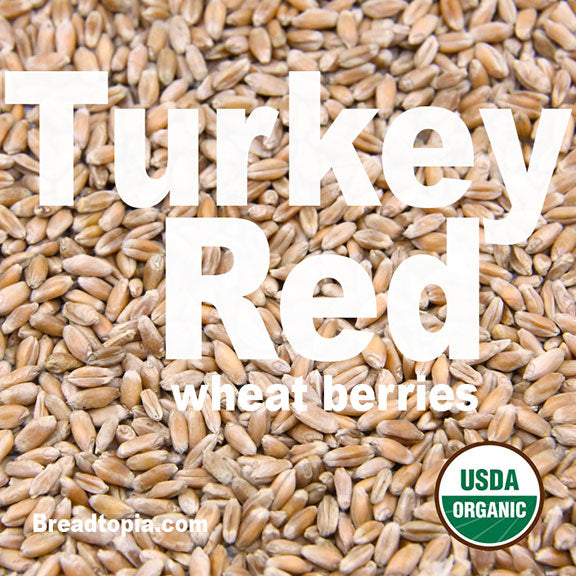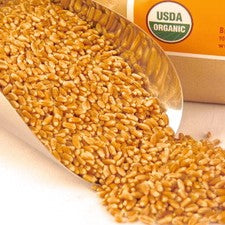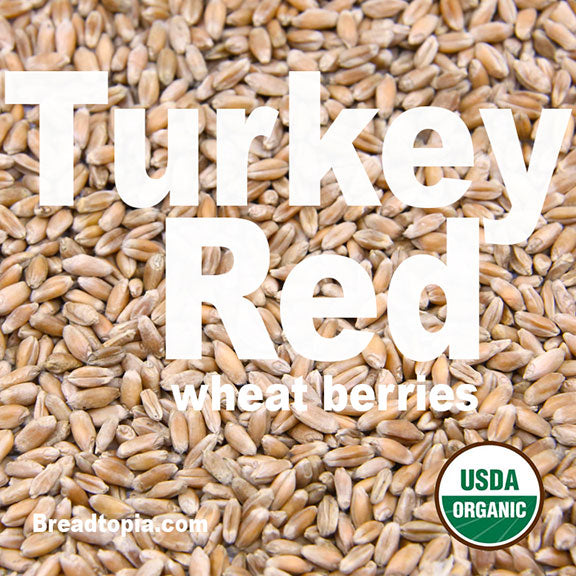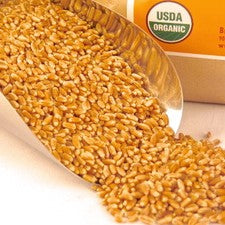Breadtopia
Organic Heirloom Turkey Red Wheat Berries
- Regular price
- $142.00 USD
- Regular price
-
- Sale price
- $142.00 USD
- Unit price
- per
Couldn't load pickup availability
Organic Heirloom Turkey Hard Red Winter Wheat Berries – 40 lb bags
These are whole unmilled organic wheat berries. Performs similarly to and can be use in place of modern Hard Red Winter wheat.
Turkey Red Wheat, once the dominant variety of hard red winter wheat planted throughout the central U.S., is back in production.
“Turkey” variety hard red winter wheat was introduced to Kansas in 1873, carried by Mennonite immigrants from Crimea in the Ukraine, fleeing Russian forced military service. In the mid-1880s, grainsman Bernard Warkentin imported some 10,000 bushels of Turkey seed from the Ukraine, the first commercially available to the general public. That 10,000 bushels (600,000 pounds) would plant some 150 square miles (10,000 acres). By the beginning of the twentieth century, hard red winter wheat, virtually all of it Turkey, was planted on some five million acres in Kansas alone. In the meantime, it had become the primary wheat variety throughout the plains from the Texas panhandle to South Dakota. Without “Turkey” wheat there would be no “Breadbasket.”
Like many traditional crop varieties, by modern times the old variety of Turkey Red had all but vanished. Fortunately, a few enterprising Midwest farmers have kept the old seed stock in production, so we are now are able to offer this heirloom wheat and flour to our customers.
Slow Food USA Recognizes Turkey Red Wheat: Brooklyn, New York – Sept. 29, 2009 – The Slow Food USA Ark of Taste, a catalog of delicious foods in danger of extinction, has been expanded to include Turkey Red Wheat as one of twelve new food products, nominated by farmers, growers, chefs and food enthusiasts from across the country who are concerned about the diversity of our food supply.
To be “boarded” onto the US Ark of Taste, a food must: (1) be at risk biologically or as a cultural tradition, (2) be linked culturally or historically to a specific region, ethnicity or traditional production practice, (3) have outstanding taste, defined in the context of local traditions and uses, and (4) have sustainable market potential.
Ark of Taste foods are those that have been threatened by market standardization, industrial agriculture, and environmental damage. “This is not only about food diversity but food security,” explains Jenny Trotter, associate director of Slow Food USA’s biodiversity program. Seventy-five percent of the world’s food now comes from only seven main crops, and from increasingly fewer varieties of those crops—ones that have been selected to produce not the most nutritious or delicious food, but those best suited to large-scale production and distribution methods.
Slow Food USA and its partners in the Renewing America’s Food Traditions (RAFT) Alliance are promoting the new concept of eater-based conservation. “We don’t want to preserve foods as museum pieces or only conserve the genetic diversity of our food supply,” said Slow Food USA’s biodiversity committee chair Ben Watson. “We want to get these foods back onto farms, back into the marketplace and back onto people’s tables.”
Share




